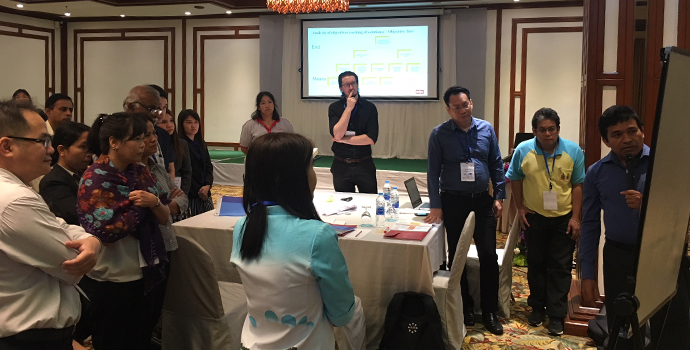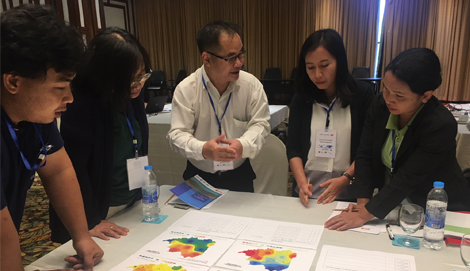- About Us
-
Who we are
-
- Publications
-
- ADPC Academy
-
MediaADPC'S NEWS
Training course on agro-ecosystem resilience in changing climate Training course on agro-ecosystem resilience in changing climate
27 - 30 Mar 2018
Phetchaburi, Thailand

Participants at the training course discussing Agro-ecosystems of Thailand
As part of its regional initiative, Asian Disaster Preparedness Center (ADPC) organized a four-day training course on “Agro-ecosystem Resilience in Changing Climate” for government officials on 27-30 March in Phetchaburi, Thailand, to enhance their understanding of using weather and climate information to strengthen resilience of the agriculture sector.
Agriculture plays a crucial role in the economy of Thailand. The results of a labor force survey in 2017 estimated that of 37.10 million people employed, 10.92 million are working in the agriculture sector. In 2012, according to the Office of the National Economic and Social Development Board, the national economic planning agency of Thailand, the agriculture sector contributed USD 40 billion to the gross domestic product (GDP) of Thailand.
The training course stimulated discussions on improving agricultural livelihood while enhancing agro-ecosystem services and functions. Key factors that influence sustainability and resilience of land-farming and aquafarming were discussed to develop interventions that can help this sector absorb the impact of climate variability.
Many studies suggest that unpredictable rain and vagaries of weather patterns have already started affecting crop productivity in many provinces. A study carried out by the International Center for Tropical Agriculture (CIAT) in 2012 predicted the total economic cost of climate change on agriculture in Thailand to fall between US$300 million to US$420 million (9.8 to 13.9 billion Thai Baht) by 2050.
Participants study impact of climate change on agriculture sector
Covering theoretical and practical aspects of “Agro-ecosystems” and “Social-ecological systems”, the training course adopts a broader paradigm where resilience of agro-ecological systems is intertwined with concepts of sustainable livelihood and food security. It embraces a view of agro-ecosystems that is inclusive of land farming systems & livestock, aqua culture, fishery and forestry practices, which strengthen sustainability and diversity, and contribute to food security of rural communities.
The livelihood of rural communities heavily depends on sustainable ecological systems to provide food security. Participants reflected on different techniques that are helpful in mitigating undesirable impacts of climate change on the ecosystem.
The training was part of ADPC’s project on “Mainstreaming Weather and Climate Information Application for Agro-ecosystem Resilience in a Changing Climate.”, aimed to enhance capabilities of scientists, policy-makers and other relevant stakeholders in the Asian and the Pacific region. The project is funded by the Asia Pacific Network (APN), Japan, under its Capacity Development Programme (CAPaBLE).Latest NewsRelated Trainings
-